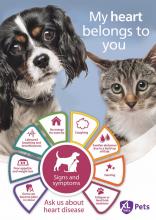During the next couple of months, we are running a campaign to help owners recognise signs of heart problems in cats and dogs, and urging you to seek prompt attention. Heart disease affects around 10% of cats and dogs in the UK. Early detection is a major factor in helping to manage the condition and increase life expectancy.
Heart problems sadly affect pets as well as people. However, heart disease in pets tends to result from problems with the heart valves and muscles, rather than coronary artery disease. Often, the condition lies undetected until the pet has difficulty maintaining its circulation, leading to signs of congestive heart failure, sudden collapse or even death. Early detection may be life-saving.
Some of our most popular breeds are prone to heart disease, with the trend towards ownership of smaller dogs highlighting the problem. Amongst the most at risk are Cavalier King Charles Spaniels, 90% of which will have heart disease by 10 years of age. Pugs, Chihuahuas and Yorkshire Terriers also carry a higher risk. Bigger breeds, sadly, don’t escape the statistics, with 50% of Boxers having heart disease by middle-age. Dobermans and Great Danes are most at risk of Dilated Cardiomyopathy (DCM), a condition where thinning and dilation of the heart muscle results in difficulty in pumping blood around the body.
Any cat can develop heart disease too, though here again, larger breeds such as the Maine Coon, carry a higher risk.
Lead Vet, Ben Dart, explains, “Early detection and treatment can make a huge difference when it comes to heart disease in your pet. As a dog or cat owner, picking up on clues can alert you to the more common signs. You should seek veterinary advice quickly if you see any of these.
Coughing, or a change in your pet’s ability to exercise, can indicate that the heart is struggling. Breathing can become laboured, or fast and shallow, and your pet might appear tired or less interested in playing or interacting with you. Weakness or wobbliness can also be an indicator and if your pet collapses or appears to faint, even if for a short time, it’s vital you get them checked. Some pets will go off their food, and others might eat more. Both weight loss can be seen as well as weight gain, and all pets with a more rounded tummy should be examined for heart disease.
“We recommend that all pets receive a health check regularly. This will include a heart check, which should be done at least annually, and twice a year for older pets or at-risk breeds. At the check, we’ll listen for abnormal sounds such as murmurs, or irregular heart rhythms. If we pick up any problems, then we will usually recommend further investigation and we have tools that can help us identify the problem quickly, and take action.
“Medications for heart disease in pets have expanded in recent years. Where we once had to rely on using human drugs to treat our patients, we now have an array of very effective veterinary medications, many of which can slow heart disease and really improve the pet’s quality of life. The key is catching it early.”
During October, we are providing a FREE Consultation, to get your pet checked out. If you would like to participant in this initiative, please call the practice on 01363 772860.
In the meantime, if you have a more immediate concern, please call and ask to speak with a vet.


